Lyndsey Cox, GiGL Senior Community Officer

An example of paper records waiting to be mobilised
Every new technology brings with it new advantages and challenges. So it has been in the world of species recording. Phone apps, websites and online recording have allowed a streamlining of the process from observer to database. Records can be uploaded at the click of a button. It is digital spreadsheets which land in my inbox most frequently, which has certainly made the process of uploading records onto the GiGL database quicker and easier but it has also taken some of the personality out of the task.
I admit that I used to look at handwritten notes with horror but now I miss the quirks of handwriting, the doodles in the corner of the page or evidence the observer has gone through a process to decide on the species; shown in the crossings out and renaming of sightings. Hastily scribbled descriptions of a site would spill over into comments about the day or passing remarks on behaviours seen; sometimes providing an insight into the observer themselves.

Some records from Orpington Field Club
We do of course still receive historical paper records and are currently working on large datasets from Orpington Field Club, with records stretching back to its beginnings in the 1960’s. With the help of volunteers, and special thanks to regular volunteer Chris Georgeiou, we’re mobilising the results of many years of their ‘Fungus Foray’ trips and annual reports – each of which hold up to 800 records. Moth records from the London Natural History Society are another success story. Digitising paper records is just one of the services we offer and is something we do for free for all voluntary organisations. It’s also one of the services we offer to Service Level Agreement partners.
So have a look in that box in your cupboard, drag out your old notebooks or newsletters and send them into us. We’d love to receive them and it means that those species sightings can then be added to the GiGL database where they will be put to good use.
